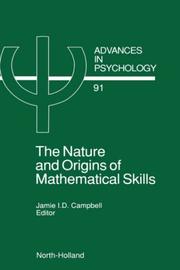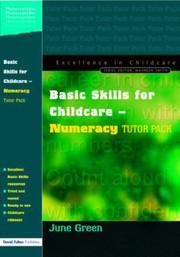| Listing 1 - 10 of 65 | << page >> |
Sort by
|
Book
ISBN: 8021090103 9788021090101 9788021090095 Year: 2018 Publisher: Brno : Masaryk University Press : Masarykova univerzita,
Abstract | Keywords | Export | Availability | Bookmark
 Loading...
Loading...Choose an application
- Reference Manager
- EndNote
- RefWorks (Direct export to RefWorks)
Kniha se primárně zaměřuje na psychologický pohled na matematické znalosti a dovednosti s důrazem na možnosti jejich měření. Podrobně rozebírá matematické myšlení z psychometrického, kognitivního, kulturního i vzdělávacího hlediska. Zaměřuje se například na rozdíly mezi muži a ženami, příčiny chybných řešení, neuropsychologické procesy zodpovídající za zpracování číselných informací a jejich vztah k jazykovému pojmenování. Kromě toho předkládá přehled testů matematických schopností a dovedností v současné době dostupných v České republice. Teoretický přehled je doplněn o elaboraci vybraných aspektů psychometrického Raschova modelu, kromě toho předkládám i výsledky vlastního výzkumu, který testuje vybranou hypotézu týkající se „kognitivních prerekvizit“ vyššího matematického usuzování.
Book

ISBN: 1510423249 9781510423244 1510423613 9781510423619 Year: 2018 Publisher: London Hodder Education Group
Abstract | Keywords | Export | Availability | Bookmark
 Loading...
Loading...Choose an application
- Reference Manager
- EndNote
- RefWorks (Direct export to RefWorks)
Mathematical ability. --- Mathematical ability --- Arithmetical ability --- Number ability --- Ability
Book
ISBN: 1423785193 9781423785194 Year: 2006 Publisher: Camberwell : Australian Council for Educational Research,
Abstract | Keywords | Export | Availability | Bookmark
 Loading...
Loading...Choose an application
- Reference Manager
- EndNote
- RefWorks (Direct export to RefWorks)
Foundation Numeracy in Context describes an approach to teaching mathematicsbased on applied and contextual learning principles. This means that the teaching andlearning of mathematics proceeds from a contextual, task-based and investigativepoint of view - where the mathematics involved is developed from a modelled situationor practical task. Practical investigations and projects are principle vehicles for studentlearning in such an approach.This text is written for teachers working with students who have become disengagedfrom learning mathematics during the middle to latter years of secondary
Numeracy --- Mathematical ability --- Mathematics --- Statistics
Book
ISBN: 1551388618 1551382962 Year: 2014 Publisher: Markham, Ontario : Portland, Maine : Pembroke Publishers Limited, Stenhouse Publishers,
Abstract | Keywords | Export | Availability | Bookmark
 Loading...
Loading...Choose an application
- Reference Manager
- EndNote
- RefWorks (Direct export to RefWorks)
Mathematical ability --- Mathematics --- Testing. --- Ability testing

ISBN: 9780080867458 0080867456 1281789607 9781281789600 9786611789602 0444890149 9780444890146 Year: 1992 Publisher: New York North-Holland
Abstract | Keywords | Export | Availability | Bookmark
 Loading...
Loading...Choose an application
- Reference Manager
- EndNote
- RefWorks (Direct export to RefWorks)
A broad range of current experimental research on numerical cognition and the acquisition of mathematical skills is covered in this volume. The individual chapters provide in-depth analysis of specific issues, methodologies, phenomena, and theory. The book is divided into two parts. In the first part the focus is on the acquisition and development of numerical skills. Part 2 of the book contains research on the information-processing basis of numerical skills, focusing on the mechanisms of perception, attention, and memory that support number skills. The range of theoretical a
Mathematics --- Mathematical ability. --- Study and teaching.
Book
ISBN: 1283434008 9786613434005 9814360996 9789814360999 9789814360975 981436097X 9789814360982 9814360988 Year: 2011 Publisher: Singapore World Scientific :Association of Mathematics Educators
Abstract | Keywords | Export | Availability | Bookmark
 Loading...
Loading...Choose an application
- Reference Manager
- EndNote
- RefWorks (Direct export to RefWorks)
The third in the series of yearbooks by the Association of Mathematics Educators in Singapore, Assessment in the Mathematics Classroom is unique as it addresses a focused theme on mathematics education. The objective is to encourage teachers and researchers to include assessment of non-cognitive attributes and to use techniques in addition to paper-and-pencil tests that focus on typical problems. Several renowned international researchers in the field have published their work in the book. The thirteen chapters of the book illustrate evidence-based practices that school teachers and researcher
Mathematics --- Mathematical ability --- Study and teaching --- Testing.
Book
ISBN: 0199910391 1283121530 9786613121530 019987705X 9780199877058 6613121533 9780199753871 0199753873 9781283121538 Year: 2011 Publisher: New York Oxford University Press
Abstract | Keywords | Export | Availability | Bookmark
 Loading...
Loading...Choose an application
- Reference Manager
- EndNote
- RefWorks (Direct export to RefWorks)
"Our understanding of how the human brain performs mathematical calculations is far from complete, but in recent years there have been many exciting breakthroughs by scientists all over the world. Now, in The Number Sense, Stanislas Dehaene offers a fascinating look at this recent research, in an enlightening exploration of the mathematical mind. Dehaene begins with the eye-opening discovery that animals--including rats, pigeons, raccoons, and chimpanzees--can perform simple mathematical calculations, and that human infants also have a rudimentary number sense. Dehaene suggests that this rudimentary number sense is as basic to the way the brain understands the world as our perception of color or of objects in space, and, like these other abilities, our number sense is wired into the brain. These are but a few of the wealth of fascinating observations contained here. We also discover, for example, that because Chinese names for numbers are so short, Chinese people can remember up to nine or ten digits at a time--English-speaking people can only remember seven. The book also explores the unique abilities of idiot savants and mathematical geniuses, and we meet people whose minute brain lesions render their mathematical ability useless. This new and completely updated edition includes all of the most recent scientific data on how numbers are encoded by single neurons, and which brain areas activate when we perform calculations. Perhaps most important, The Number Sense reaches many provocative conclusions that will intrigue anyone interested in learning, mathematics, or the mind. "A delight." --Ian Stewart, New Scientist "Read The Number Sense for its rich insights into matters as varying as the cuneiform depiction of numbers, why Jean Piaget's theory of stages in infant learning is wrong, and to discover the brain regions involved in the number sense." --The New York Times Book Review "Dehaene weaves the latest technical research into a remarkably lucid and engrossing investigation. Even readers normally indifferent to mathematics will find themselves marveling at the wonder of minds making numbers." --Booklist"-- "Our understanding of how the human brain performs mathematical calculations is far from complete. In The Number Sense, Stanislas Dehaene offers readers an enlightening exploration of the mathematical mind. Using research showing that human infants have a rudimentary number sense, Dehaene suggests that this sense is as basic as our perception of color, and that it is wired into the brain. But how then did we leap from this basic number ability to trigonometry, calculus, and beyond? Dehaene shows that it was the invention of symbolic systems of numerals that started us on the climb to higher mathematics. Tracing the history of numbers, we learn that in early times, people indicated numbers by pointing to part of their bodies, and how Roman numerals were replaced by modern numbers. On the way, we also discover many fascinating facts: for example, because Chinese names for numbers are short, Chinese people can remember up to nine or ten digits at a time, while English-speaking people can only remember seven. A fascinating look at the crossroads where numbers and neurons intersect, The Number Sense offers an intriguing tour of how the structure of the brain shapes our mathematical abilities, and how math can open up a window on the human mind"--
Number concept. --- Mathematics --- Mathematical ability. --- Study and teaching --- Psychological aspects. --- Mathematical ability --- Number concept --- Psychological aspects

ISBN: 0367089750 1315064847 1134007582 9781134007585 1843120232 9781843120230 9781315064840 9781134007653 9781134007721 1134007655 Year: 2003 Publisher: London
Abstract | Keywords | Export | Availability | Bookmark
 Loading...
Loading...Choose an application
- Reference Manager
- EndNote
- RefWorks (Direct export to RefWorks)
This series covers the Basic Skills curriculum in literacy and numeracy specifically for childcare students at Further Education level.
Numeracy --- Mathematical ability --- Mathematics --- Statistics --- Study and teaching (Elementary)
Book
ISBN: 0128017937 012801637X 9780128016374 9780128017937 Year: 2016 Publisher: Amsterdam, [Netherlands] : Academic Press,
Abstract | Keywords | Export | Availability | Bookmark
 Loading...
Loading...Choose an application
- Reference Manager
- EndNote
- RefWorks (Direct export to RefWorks)
Number concept. --- Mathematics --- Psychological aspects. --- Number concept --- Mathematical ability --- Cognition --- Psychological aspects --- Psychology --- Math --- Science --- Apperception --- Mathematical ability - Psychological aspects
Book
ISBN: 1281762369 9786611762360 0080559778 0123736293 9780123736291 9780080559773 Year: 2008 Publisher: London : Academic,
Abstract | Keywords | Export | Availability | Bookmark
 Loading...
Loading...Choose an application
- Reference Manager
- EndNote
- RefWorks (Direct export to RefWorks)
This book examines the mathematical difficulties in typical and atypical populations. It discusses the behavioural, educational and neuropsychological characteristics of people with mathematical difficulties, and educational interventions to prevent, diagnose, treat or ameliorate such difficulties. The book brings together studies from different disciplines, including developmental psychology, neuroscience and education, and includes perspectives from practicing teachers.The book is divided into three major sections. The first includes chapters about the nature and characteristics of m
Mathematical ability. --- Mathematical ability in children. --- Mathematics --- Psychological aspects. --- Math --- Science --- Ability in children --- Arithmetical ability --- Number ability --- Ability
| Listing 1 - 10 of 65 | << page >> |
Sort by
|

 Search
Search Feedback
Feedback About UniCat
About UniCat  Help
Help News
News